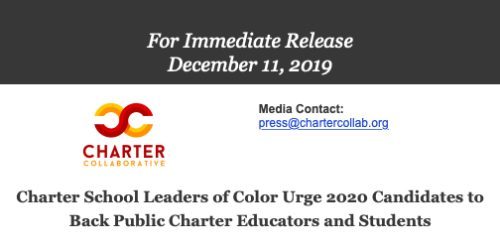
Yesterday, the National Charter Collaborative shared a powerful letter from nearly 400 charter school leaders of color urging candidates ‘to adopt a more fact-based and nuanced view’ of public charter schools. The letter speaks to the heart of why public charter schools exist, and why communities of color continue to support expanding public school choice options. It’s a true must read; we’ve included the full text of the letter below, with permission.
We are not politicians nor activists. We are educators—educators of color, in particular. We became educators because for too long children of color have been denied equal educational opportunity.
At the founding of our country, it was a crime in much of the nation to teach Black children how to read. In the Jim Crow era, the law specifically relegated Black and Brown children to segregated, under-resourced schools and the broad societal norm was that children of color were fit not for the vanguard of the nation’s political, economic, and cultural leadership, but for the margins of our society.
The post-Jim Crow era has been characterized by fits and starts concerning racial integration, equitable funding, whole-school reform and innovation, and yet our public schools continue to fail too many Black and Latinx children.
Throughout this history, educators of color have been at the forefront of providing educational opportunity for Black and Brown children, sending generations of children to the nation’s best colleges—minority-serving institutions and otherwise—and putting the lie to racist assumptions about the intellectual competencies of children of color.
It is in this context that we, the undersigned, opened public-charter schools in our communities—for most of us, the very communities in which we were raised. We opened our schools not to engage in political fights about governance, nor to wage war with various political interests—whether the teachers’ unions or alleged union-busting corporatists—but for the same reason African American and Latinx educators have worked tirelessly for Black and Brown children for centuries: we know our children best, we know they are not being educated as they should, and we seek to fill the breach.
We opened public charter schools because they gave us the autonomy that honored our professional skill as educators. Our schools provide greater opportunities to expand the curriculum, introduce innovative instructional methods, diversify our teaching force, and respond individually and in real-time to the particular needs of our children.
Charter leaders have used this autonomy to produce a sector that, in our urban areas in particular, have provided strong options alongside our traditional public schools. Not only do students attending high quality public charter schools receive the equivalent of three to five months of additional learning time, they’re also more likely to graduate from high school, attend and persist in college, and have higher future earnings than their peers who attend traditional public schools.
Unsurprisingly, then, overwhelming majorities of Black and Latinx parents support their right to choose the best school for their child. Nationally, 86% of African American voters and 67% of Latino voters support a variety of public school options, including public charter schools.
Alongside the clear polling data, our experience on the ground bears this out—like public-charter schools generally, we have long waiting lists of families clamoring for seats in our schools. It should be self-evident that empowering communities of color means honoring their choices, not seeking paternalistically to make decisions for them, particularly when the data show their choices generally lead to better outcomes for their children.
We agree that public charter schools should operate with transparency and accountability. Our schools face closure generally in any three-to-five year period in which we cannot show positive outcomes for our students. We embrace that kind of accountability and wish our traditional-district counterparts faced the same reckoning if they are not consistently able to show they’re making a difference for children of color.
We write now because we felt we could no longer be silent. It seems to be vogue now for politicians to beat up on charter schools and castigate them categorically and unfairly as part of some sort of corporate takeover of public education.
Our experience is the diametric opposite. We operate public charter schools because we see their promise to empower talented educators of color to serve communities that for generations have received too little and, in so doing, provide children of color the educational opportunities they so richly deserve.
Those who broadly oppose charter schools oppose us, and the families, communities, and missions we serve, and we implore our nation’s leaders to adopt a more fact-based and nuanced view on this issue that honors not only the actual results of public charters in educating young people of color, but the way in which public-school choice empowers communities of color with the right to decide for themselves the kind of education that best meets their children’s needs.
You can find the original letter here.